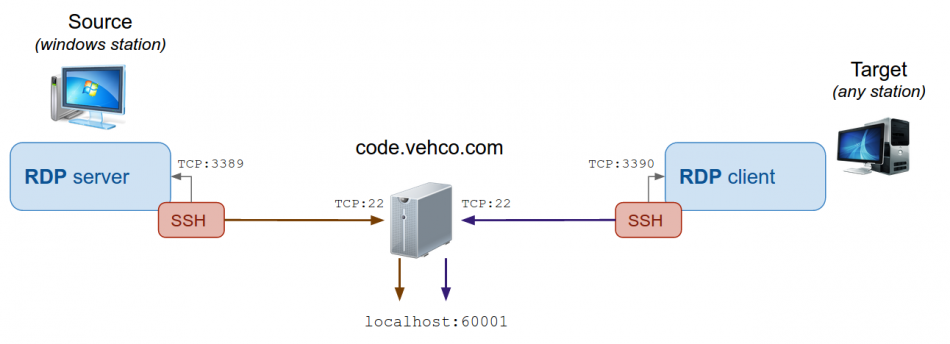Difference between revisions of "Remote desktop using SSH tunneling"
| (One intermediate revision by the same user not shown) | |||
| Line 1: | Line 1: | ||
[[Category:Linux]] | [[Category:Linux]] | ||
| − | |||
=Principle= | =Principle= | ||
| Line 132: | Line 131: | ||
=Target PC - Linux computer= | =Target PC - Linux computer= | ||
| − | Create a SSH tunnel: | + | |
| + | ==Create a SSH tunnel== | ||
| + | |||
| + | You can use the SSH -L command. The pattern is: | ||
| + | |||
| + | SSH -L localComputer:remoteComputer | ||
| + | |||
| + | |||
| + | So: | ||
| + | |||
<syntaxhighlight lang="bash"> | <syntaxhighlight lang="bash"> | ||
ssh -v -N -L 127.0.0.1:3390:127.0.0.1:60001 myLogin@code.vehco.com | ssh -v -N -L 127.0.0.1:3390:127.0.0.1:60001 myLogin@code.vehco.com | ||
</syntaxhighlight> | </syntaxhighlight> | ||
| + | [!] replace 3390 by your LOCAL port | ||
| + | |||
| + | [!] replace 60001 by the port you previously chose. | ||
[!] replace ''mylogin'' and ''code.vehco.com'' by our own server! | [!] replace ''mylogin'' and ''code.vehco.com'' by our own server! | ||
| + | Since you're already log-on to the remote server through SSH you don't need to put "code.vehco.com" again ; 'localhost' is enough. | ||
| − | |||
| − | |||
| − | |||
| + | ==RDP client== | ||
| − | + | Just execute a RDP client and connect to '''localhost:3390''' | |
| − | |||
That's All !! :-) | That's All !! :-) | ||
| − | |||
Latest revision as of 14:37, 15 October 2014
Contents
Principle
Sometimes you cannot open the external Windows RDP port TCP 3389. It can be for a security reason or simply because you do not manage your company's firewall.
To overcome this problem you can use a SSH tunnel. That's how it look like:
Requirements
- You must be able to SSH to the middle server (code.vehco.com in the example) from both ends [source + target].
- The source computer is a Windows workstation.
- The target computer can be anything: iPad, Windows, Linux, Android...
Source PC
Requirements
- Windows computer with RDP enable
- Bitvise # Tunnelier -> http://www.bitvise.com/download-area
How to proceed?
- Enable Windows RDP
- Install Bitvise # Tunnelier
- Create a SSH tunnel
- Start Tunnelier
- Go to the S2C tab
- Add a new entry
- LISTEN => remote server (code.vehco.com in that example)
- LISTEN interface: 127.0.0.1
- LISTEN port: what_you_want (ex: 60001)
- DESTINATION => local machine (RDP server)
- DESTINATION interface: localhost
- DESTINATION port: 3389
- LISTEN => remote server (code.vehco.com in that example)
- Go to the login tab
- server: code.vehco.com
- port: TCP 22
- login: myLogin
- passwd: myPassword
- Save your profile
- Start your profile
How to start Bitvise on boot?
To start Bitvise automatically:
- Create a new entry in your Windows > Start menu > startup folder
- put the following shortcut: "C:\Program Files (x86)\Bitvise SSH Client\BvSsh.exe" -profile="portforward.tlp" –loginOnStartup
where portforward.tlp is the name of your profile.
Limitations
- [!] You have to log-in on your PC for the SSH tunnel to work.
- [!] You should disable screensavers | energy savers otherwise your PC will NOT be available anymore.
Target PC - Windows computer
Requirements
- Bitvise # Tunnelier -> http://www.bitvise.com/download-area
How to proceed?
Bitvise configuration
- Install a RDP client or use the default one (Microsoft Windows Remote Desktop)
- Install Bitvise # Tunnelier
- Go to the S2C tab
- Add a new entry
- LISTEN => remote server (code.vehco.com in that example)
- LISTEN interface: 127.0.0.1
- LISTEN port: what_you_put_earlier (ex: 60001)
- DESTINATION => local machine (RDP client)
- DESTINATION interface: localhost
- DESTINATION port: 3390
- LISTEN => remote server (code.vehco.com in that example)
- Go to the login tab
- server: code.vehco.com
- port: TCP 22
- login: myLogin
- passwd: myPassword
- Save your profile
- Start your profile
[!] Note the local TCP 3390 ! Not TCP 3389 !!
[!] Don't forget to adjust the port number 60001
RDP configuration
- Start Windows RDP
- Connection to: localhost:3390
That's All !! :-)
Target PC - Linux computer
Create a SSH tunnel
You can use the SSH -L command. The pattern is:
SSH -L localComputer:remoteComputer
So:
ssh -v -N -L 127.0.0.1:3390:127.0.0.1:60001 myLogin@code.vehco.com[!] replace 3390 by your LOCAL port
[!] replace 60001 by the port you previously chose.
[!] replace mylogin and code.vehco.com by our own server!
Since you're already log-on to the remote server through SSH you don't need to put "code.vehco.com" again ; 'localhost' is enough.
RDP client
Just execute a RDP client and connect to localhost:3390
That's All !! :-)
